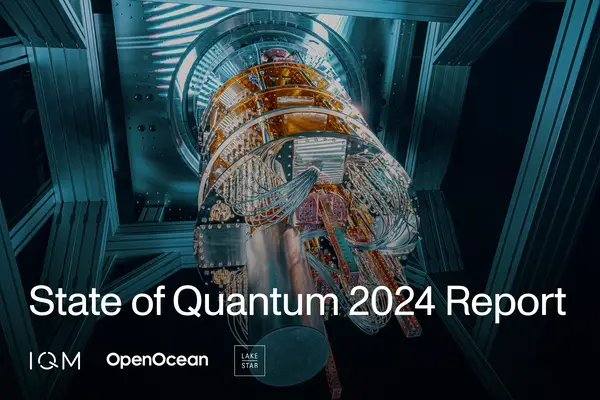Insider Brief
- IQM Quantum Computers, OpenOcean and Lakestar, in association with TQI, released the OpenOcean–IQM–Lakestar State of Quantum 2024 Report.
- The report shows that that quantum computing has been resilient to overall downturns in the global economy.
- Strong government backing and continued investment momentum in Europe has buoyed the industry.
PRESS RELEASE — Today, IQM Quantum Computers, a global leader in building quantum computers, OpenOcean, a leading European venture capital firm, and Lakestar, the leading European technology investor, have released the OpenOcean–IQM–Lakestar State of Quantum 2024 Report, in association with The Quantum Insider (TQI). The report shows that quantum computing has been resilient to overall downturns in the global economy, with continued growth backed up by strong government backing and continued investment momentum in Europe.
This investment pullback is attributed to an overall decline in technology investing, and not to falling interest in quantum technology. Outside the US, quantum investments showed resilience in 2023, and governments are picking up the slack with major new national quantum funding commitments. This report draws insights from in-depth interviews with a wide range of enterprise end users, vendors and research institutions, including HSBC, Dell, Federal Reserve, Citi & Moderna. It analyses investment data from TQI and tracks the continued progress in national quantum computing centres across Europe and North America.
The report aims to provide clarity on key themes around the traction of quantum computing use cases and national quantum strategies, the interplay with AI, and recommendations for developing quantum-readiness.

The latest TQI data reveals several notable year-on-year comparisons:
- A 50% drop occurred in venture capital invested into quantum startups from $2.2 billion in 2022 to around $1.2 billion in 2023 globally – Europe, the Middle East and Africa grew by 3%, the United States saw an 80% decline, and the APAC region declined by 17%.
- Over 30 governments have committed to more than $40 billion in public funding commitments to quantum technologies which will be deployed in the next 10 years.
- Of these governments actively involved in quantum technologies, over 20 have formulated coordinated policies, funding, and roadmaps.
- National labs and quantum computing centres have accelerated practical applications with dedicated quantum computing centres and hubs emerging.
- Annual government funding commitments to quantum represent an estimated 2x the quantum VC investment peak in 2022.
Key themes from interviews with thought leaders across the quantum value chain:
Developing internal quantum expertise and readiness is becoming a top priority for leading organisations across sectors like financial services and pharmaceuticals.
Experts are aligned on the short-term importance of quantum hybrid systems, recognising their potential to unlock immediate value for businesses.
There is not a quantum winter, but the investment landscape is certainly colder. Start-ups need to be realistic, and manage their funding roadmaps carefully.
Governments are important sources of patient capital to provide long-term backing for quantum, and overcome the high initial costs of Research & Development.
Artificial intelligence and quantum computing are technologies that can benefit from each other, with lots of early research into use cases like generative chemistry and digital twins. However, Investors should take care that the hype around AI does not cannibalise attention on quantum.
Preparing for the quantum era
Over 300 end users across sectors like healthcare, financial services, and material sciences are already exploring use cases and strategically building quantum readiness. With quantum advantage potentially years away, these leading organisations are taking steps, today, to prepare for the long runway towards commercial quantum computing.
Dr. Jan Goetz, CEO and Co-founder of IQM Quantum Computers, said: “2023 was a year of steady technological progress resulting in larger qubit counts and initial error correction, as companies successfully published and followed quantum roadmaps. We also saw real systems deployed in national labs, steadily crossing into practical applications as we continue the journey to full-scale commercial problem-solving.
“However, the algorithmic side remains less predictable. While scaling processors is largely an engineering challenge, estimating timelines for software improvements is more dependent on hardware progress. Still, in 2023, we observed more contributions from non-quantum experts like systems engineers, bringing valuable real-world experience and bringing us closer to solving the talent bottleneck.”
Ekaterina Almasque, General Partner at OpenOcean, said: “While venture funding temporarily cooled, our research confirms the steady momentum towards the quantum era. The findings signal that 2024 can become a year of growing confidence in quantum computing’s potential, despite still a relative lack of private capital flowing into that space. Significant use cases emerging to unlock its commercial promise. Having said that, achieving widespread adoption requires a full quantum technology stack to evolve.
“We have a chance to establish trillion-dollar quantum software leaders, but only by ensuring hardware, algorithms and interfaces serve particular real world use cases. As macro conditions evolve, pragmatic innovation focused on quantum-business fit will be key. Many industries that are not preparing for the quantum era would risk falling behind in the quantum future.”
Stephen Nundy, Partner & CTO at Lakestar, said: “The quantum hype cycle climbed quickly and has recalibrated back closer to reality. But the greater collaboration emerging between software and hardware players on bridging immediate needs reaffirms that quantum-readiness remains an inevitability.
“To fully realise quantum’s potential, we must take a strategic, full-stack approach – ensuring hardware, software, interfaces and talent develop in harmony. This requires actively partnering with corporate end-users to understand commercial needs and co-create domain-specific solutions. If we can come together to solve these engineering challenges, the chance remains to build the next era’s leading multi-billion dollar quantum corporations.”
Read the IQM–OpenOcean–Lakestar State of Quantum 2024 report here: State of Quantum 2024 Report
About IQM Quantum Computers
IQM is the global leader in building quantum computers. IQM provides on-premises quantum computers for supercomputing centres and research labs and offers full access to its hardware. For industrial customers, IQM delivers quantum advantage through a unique application-specific, co-design approach.
IQM’s commercial quantum computers include Finland’s first commercial 50-qubit quantum computer with VTT, IQM-led consortium’s (Q-Exa) HPC quantum accelerator in Germany, and IQM processors will also be used in the first quantum accelerator in Spain.
IQM has over 300 employees with offices in Espoo (Finland), Munich (Germany), Madrid (Spain), Paris (France), Singapore, and Palo Alto (CA, US).
About OpenOcean
OpenOcean is an early-stage venture capital firm investing in frontier technologies across Europe, with offices in London and Helsinki. Our mission is to invest in disruptive B2B platforms, including data infrastructure, AI, cybersecurity, next-generation software development and enterprise automation, to build the backbone of the future data economy.
OpenOcean’s DNA is rooted in having a deep understanding of the underlying technology and software stacks, which drive the growth of innovative new digital platforms and services. With an entrepreneurial background from building several category-defining software businesses such as MySQL, we work together with founders to build and scale global category-leading companies.
OpenOcean’s portfolio includes a range of leading European startups such as IQM, MindsDB, Binalyze, Supermetrics and Truecaller.
Visit us on LinkedIn or at https://www.openocean.vc/
About Lakestar
Lakestar is one of the leading pan-European venture capital firms. Lakestar’s mission is to find, fund and grow disruptive businesses that are enabled by technology and founded by exceptional entrepreneurs in Europe and beyond. Founded by Klaus Hommels, the team’s early investments include Skype, Spotify, Facebook and Airbnb. Since raising its first fund in 2012, Lakestar manages an aggregated volume of over €2bn across four early stage funds and two growth funds.
The team actively advises and supports portfolio companies in marketing, recruitment, technology, product development and regulatory insight, accompanying founders from seed to early stage, growth stage or exit. Lakestar currently has the privilege of holding investments in Neko Health, Revolut, GetYourGuide, sennder, Eigen, Public.com, builder.ai, Yapily, Terra Quantum, IsarAerospace, accuRx, Rhino and Auterion to name a few. A long-standing champion for Europe’s digital sovereignty, Lakestar has a presence in London, Berlin and Zurich with a team of 35 talented individuals from 18 countries.
Visit us on LinkedIn and our website www.lakestar.com
About The Quantum Insider
The Quantum Insider is the leading provider of media and market intelligence on the quantum technology industry. The business provides daily business journalism, analysis, and interviews through its media site. Through its proprietary intelligence platform, it delivers critical insights to its customers across startups, academia, governments and corporations. The business is part of Resonance which owns and operates a portfolio of high growth tech verticals. Resonance is venture backed and headquartered in Toronto, Canada.
Visit us on LinkedIn and our website www.thequantuminsider.com
If you found this article to be informative, you can explore more current quantum news here, exclusives, interviews, and podcasts.
















